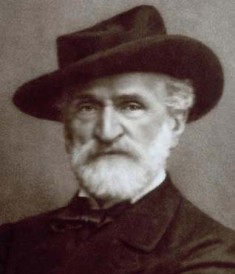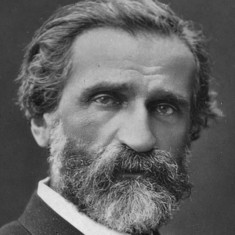| Giuseppe Verdi | |
|---|---|
 |
|
| Composer | |
| Born | Oct. 10, 1813 |
| Died | Jan. 27, 1901 |
| Nationality | Italian |
The Italian musical composer Giuseppe Verdi is widely considered to be among the greatest composers of the 19th century, comparable only to Richard Wagner, the German composer. In an era that produced some of the greatest operatic composers of all time, Verdi’s accomplishments are extraordinary and have stood the test of time.
Birth and Early Years
Giuseppe Verdi was born in 1813 in what is today Italy, but at the time was territory controlled and administered by the French. His birth city was Le Roncole, located in today”s northwestern Italian province of Parma.
Many aspects of Verdi’s childhood have long been in question, and are the subject of considerable debate. That is partly because he was born into turbulent times when the Napoleonic Wars were wreaking havoc across Europe. International boundaries were shifting and Italy itself was as yet a fragmented collection of states and principalities.
Verdi maintained, perhaps for romantic reasons of his own, that his father, Carlos Verdi and his mother, Luigia Uttini, were illiterate peasants. This is almost certainly untrue, however. Carols Verdi was known to be a landowner and an innkeeper. Both he and his mother were not illiterate, as documents show.
Whatever the case, Verdi was baptized into the Catholic faith. His birth certificate records his name as Joseph Fortunin François, as documented by the French civil authorities. He later came to be known by the name of his parent’s choice, Giuseppe Verdi, after French influence waned in northern Italy.
Educational Years
Giuseppe Verdi’s obvious natural talent for music was recognized early. He was enraptured by the sound of the church organ as a child. At age seven his father wanted to encourage his son’s interest, so he purchased for him an old and battered spinet, which is a type of piano. Young Giuseppe mastered the instrument by age nine and he was sent to study music in the nearby city of Busetto at a school administered by Ferdinando Provesi. Here again, Verdi was recognized as a superior musical talent.
At age 20 he went to Milan to continue his education in music. He was rejected for enrollment by a major music conservatory, however, because he was already two years past his 18th birthday. But it was in Milan that he was exposed to a rich environment of opera and concert music. That, along with further studies obtained mostly through private tutors, Verdi honed his skilled and nurtured his gift. He was encouraged by his teachers and others to become an operatic composer.
Career Beginnings and Tragedy
Still at age 20, Verdi landed a job in Busetto as the town’s music master. Shortly thereafter, he met a young woman for whom he was hired to provide music lessons. Her name was Margherita Barezzi, and Verdi quickly fell madly in love with her.
They were married, but the union ended in tragedy when Margherita contracted encephalitis at the age of 26 and died. Two children born to the couple had previously also died in infancy. Verdi was shattered by these tragic losses. He was working on his first operatic composition at the time.
Early Compositions and Works
 Giuseppe Verdi completed his first opera in 1839. This work was titled Oberto. It was performed in Milan and the work met with enough success and recognition to bring Verdi a commission for three more works.
Giuseppe Verdi completed his first opera in 1839. This work was titled Oberto. It was performed in Milan and the work met with enough success and recognition to bring Verdi a commission for three more works.
His second work, Un giorno di regno, was a disaster, however. That, along with the recent death of his wife, drove Verdi into deep despair. He nearly abandoned music, but began writing again with encouragement from friends and colleagues.
What followed was an intense 16-year period in which he produced 14 operatic compositions. The most important result of this period was his Macbeth, although there is debate among critics about the best pieces to come from this period.
Recognition and a Lasting Legacy
Verdi eventually remarried. He formed a relationship with an operatic soprano of great renown, Giuseppina Strepponi. The couple created a considerable scandal for cohabitating for a time, but their eventual marriage set the matter to rest, and Giuseppina became his life companion.
From the 1840s through the middle of the 1850s are considered Verdi’s “middle years,” during which he began to produce works of masterful quality. He composed one of his greatest masterpieces, Rigoletto, in 1851.
He would go on to compose what remains today among the greatest operas of all time, including Aida, La traviata, and Nabucco, just to name a few. Many of the themes or songs to emerge from these works have found a place in popular culture, such as The Grand March from Aida and The Drinking Song from La traviata.
Giuseppe Verdi passed away on January 27, 1901, only a few days after suffering a stroke at the Grand Hotel et de Milan. His funeral still remains as the largest public assembly in Italy’s history.